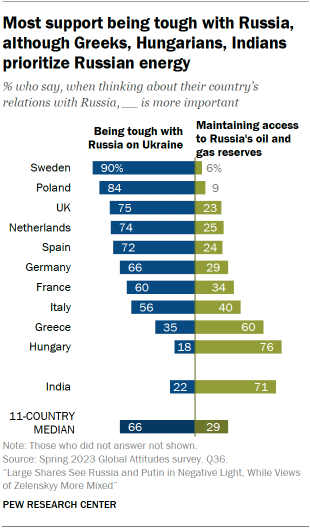
In countries across Europe, and in India, where Russian oil access is a particularly salient issue, respondents were asked whether being tough with Russia on Ukraine or maintaining access to Russia’s oil and reserves was more important when considering their country’s relations with Russia. Across the 11 countries where the question was asked, a median of 66% say that it is more important to be tough with Russia on Ukraine, while 29% say maintaining access to Russia’s oil and gas reserves is more important.
The sentiment that being tough with Russia on Ukraine is more important is strongest in Sweden, where nine-in-ten say this. Shares of roughly three-quarters or more in the Netherlands, Poland, Spain and the UK also say the same. In Hungary and India, however, only around two-in-ten agree. Over seven-in-ten instead say that maintaining access to Russia’s oil and gas reserves is more important. A majority of Greeks also say it is more important to maintain access to Russian energy.
In Europe, right-wing populist supporters have historically expressed more confidence in Putin, though this sentiment dropped sharply in the wake of the Russian invasion. Supporters of several right-wing populist parties are more likely to prefer maintaining access to Russian oil than those who do not support these parties. For example, in Germany, six-in-ten of those who have a favorable view of Alternative for Germany say maintaining access to Russian energy is more important, compared with the roughly two-in-ten among those who do not support Alternative for Germany.
Views also vary somewhat by ideology. In about half of the countries surveyed, those on the left of the political spectrum are more likely say that being tough with Russia on Ukraine is more important than maintaining access to Russia’s oil and gas reserves. This difference is most evident in Hungary, where 45% of those on the left prioritize being tough with Russia on Ukraine over maintaining Russian oil access, compared with the 10% of those on the right who agree.


